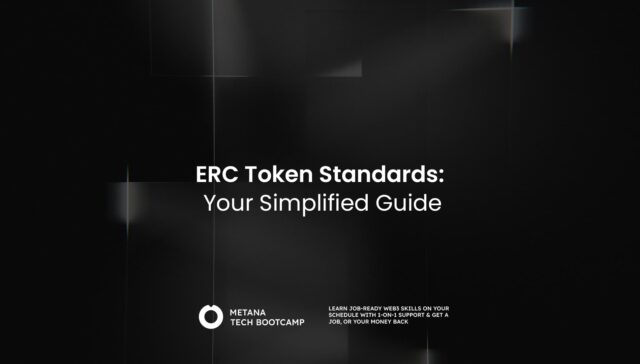
The Solidity compiler is the essential tool that converts high-level Solidity code into a format that the Ethereum Virtual Machine (EVM) can understand. Whether you’re building smart contracts for DeFi, NFTs, or decentralized applications, the Solidity compiler transforms your code into bytecode, which the EVM then executes, while also generating an Application Binary Interface (ABI) to enable interaction with external applications.
In this article, we’ll dive into how the Solidity compiler works and explore its key features that make it indispensable for Smart Contract development.
How Does the Solidity Compiler Work?
The Solidity compiler converts human-readable smart contract code into a form that the Ethereum Virtual Machine (EVM) can execute, known as bytecode. The compilation process happens in multiple stages:
- Lexing & Parsing: The compiler breaks down the Solidity code into tokens and generates an Abstract Syntax Tree (AST) to map out its structure.
- Static Analysis: The code is then checked for errors such as syntax issues, type mismatches, and potential security vulnerabilities. This stage ensures the contract is logically sound.
- Optimization: Once verified, the compiler applies optimizations to make the contract more gas-efficient, helping to reduce transaction costs by eliminating unnecessary computations or simplifying complex operations.
- Bytecode Generation: Finally, the compiler translates the optimized code into EVM bytecode, which is deployed to the Ethereum network and executed by the EVM.
In addition to bytecode, the Solidity compiler produces an Application Binary Interface (ABI), which defines how external applications can interact with the contract’s functions. The ABI is often accessible on-chain and can be retrieved by anyone with the contract address, making it easier for users and developers to interact with deployed smart contract and also verify the code that they are interacting with.

Key Features of the Solidity Compiler
The Solidity compiler offers several essential features that help developers create more secure and efficient smart contracts:
- Error Handling: The compiler performs static analysis to detect syntax errors, type mismatches, and potential vulnerabilities before deploying the contract. This helps catch common issues early in the development process.
- Optimization: During compilation, the Solidity compiler optimizes the contract’s bytecode, reducing unnecessary operations and making the contract more gas-efficient. This can significantly reduce the cost of executing transactions on the Ethereum network.
- Compilation Targets: The Solidity compiler supports different compilation targets, including EVM bytecode and Yul, a low-level intermediate language. This flexibility allows developers to optimize their contracts for different use cases or blockchain environments.
The Solidity compiler has evolved significantly over time, with each new version introducing enhanced security features, better optimization techniques, and additional support for advanced functionalities like Yul. Staying up-to-date with the latest versions ensures that developers can benefit from these improvements, while still maintaining compatibility with older contracts when necessary. For a detailed list of all Solidity compiler releases and their updates, you can refer to the Solidity Release Blog.
How to Install the Solidity Compiler
Getting started with the Solidity compiler is easy, and there are several ways to install it depending on your environment and needs. Below are some of the most common methods for installing the compiler.
1. Installing with npm/Node.js
One of the simplest ways to install the Solidity compiler is via npm, a package manager for JavaScript. This method is particularly convenient if you’re using Node.js for other parts of your development.
- To install solc.js (the JavaScript version of the Solidity compiler), run the following command:
npm install -g solc- After installation, you can verify the installation by checking the version:
solcjs --versionThis will install the compiler globally on your system and provide a simple way to compile contracts.
2. Using Docker
For a more contained environment, you can use Docker to run the Solidity compiler. Docker ensures that the compiler runs in a consistent environment, making it a great option for cross-platform development.
- First, pull the official Solidity Docker image:
docker pull ethereum/solc- After downloading the image, verify the installation with this command:
docker run ethereum/solc:stable --version- You can then compile Solidity files using Docker by mounting a local folder and running the compiler:
docker run -v /local/path:/sources ethereum/solc:stable -o /sources/output --abi --bin /sources/Contract.solThis command compiles the Contract.sol file, generating both the ABI and bytecode in the specified output directory.
3. Installing on macOS and Linux
For macOS and Linux users, installing the Solidity compiler is straightforward with package managers like Homebrew for macOS or the standard package management tools for Linux.
macOS:
- Run the following commands to install the Solidity compiler using Homebrew:
brew update
brew upgrade
brew tap ethereum/ethereum
brew install solidity- Verify the installation with this command:
solc --versionLinux:
- On Linux, you can install Solidity via apt:
sudo add-apt-repository ppa:ethereum/ethereum
sudo apt-get update
sudo apt-get install solc- Verify the installation:
solc --versionBy following these steps, you’ll have the Solidity compiler installed and ready to use, no matter which environment you’re working in.
Wrapping Up: The Solidity Compiler’s Role in Smart Contract Development
The Solidity compiler plays an indispensable role in transforming smart contract code into a format the Ethereum Virtual Machine can understand. From ensuring code correctness through static analysis to optimizing bytecode for gas efficiency, the compiler is a key tool for developers building on Ethereum. As the compiler continues to evolve, staying updated with the latest versions helps developers write more secure, efficient, and feature-rich contracts. Understanding the nuances of how it works and utilizing its features will ultimately lead to better smart contracts.
FAQs:
What is the Solidity compiler?
- The Solidity compiler translates Solidity code into Ethereum bytecode, allowing smart contracts to be deployed and run on the Ethereum blockchain.
Why is the Solidity compiler important?
- It ensures that the Solidity code you write is transformed into a format the Ethereum Virtual Machine (EVM) can understand and execute.
How do I use the Solidity compiler?
- You can use the Solidity compiler via command-line tools like
solcor integrated development environments (IDEs) such as Remix.
What is bytecode in Solidity?
- Bytecode is the low-level machine code generated by the Solidity compiler, which is executed by the Ethereum Virtual Machine (EVM).
Can I view the compiled bytecode?
- Yes, most IDEs and compilers, like Remix, allow you to view the bytecode output after compiling your Solidity code.







